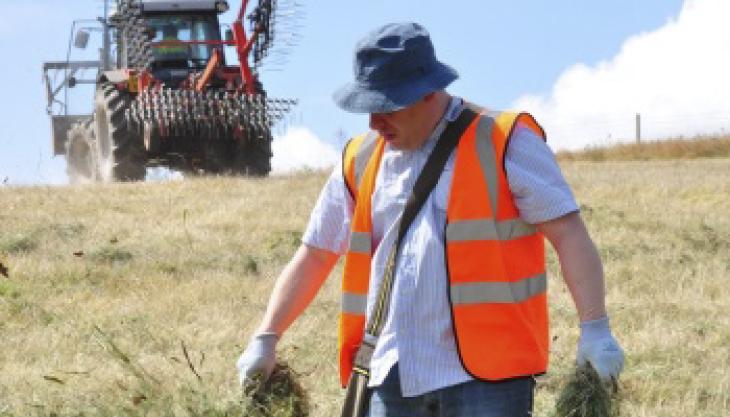Tarmac aim to create wildflower haven at Bayston Hill

Company hopes to transform section of screening bund into wildlife-rich hay meadow
A SECTION of Bayston Hill Quarry, near Shrewsbury, is to be transformed into a rich wildlife haven after two truckloads of wildflower hay were scattered on parts of the Tarmac site.
The Severn Gorge Countryside Trust (SGCT), working with Littlehales Environmental, transferred the freshly cut long grasses and wildflowers from its Ropewalk Meadow site in Coalbrookdale to an area of restored grassland on the quarry’s 25ha screening bund.
Michael Charlton, restoration manager at Tarmac, who are making a donation of £1,000 to the charity for the wildflower hay, said: ‘We hope the seeds will begin to germinate next spring, although the grassland is likely to take about five years to develop into a species-rich wildflower haven.’
The transfer of seeds and green hay has been arranged as part of a carefully designed biodiversity action plan (BAP) at the quarry to encourage more wildlife to the site. The meadow area will complement native woodland planting of 12,000 trees and 1,300m of hedgerow, conservation ponds and rocky scree outcrops which have also been created at the site.
The screening bund was built in 2009 as part of the Tarmac quarry extension to allow 30 million tonnes of gritstone to be extracted for road surfacing and construction.
Mr Charlton continued: ‘The construction of the bund has created opportunity for a large-scale habitat creation project and in an early success, we have already had skylarks breeding at the site, which would not have happened before as the land was intensively farmed. It is very exciting to see wildlife returning to the site.
‘Although the habitat-creation works are complete, the ongoing management is vital to ensure the habitats reach their full potential and this aspect of the work will be managed through the site BAP. There will be a closely monitored cutting and grazing regime along with the addition of seed from other local wildflower grassland sites.’
Russell Rowley, manager of the SGCT, said: We are pleased to be able to work with Tarmac to assist them in the restoration of a grassland site through providing green hay full of wildflower seed, in return for a charitable donation which will be put towards further management of our wildflower hay meadows.
‘Meadows of this quality have been disappearing throughout the UK, and it is vitally important that we retain and manage them for their species and for future generations.’



